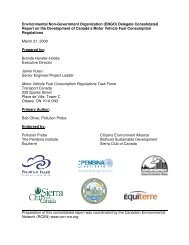Primer on Bioproducts - BIOCAP Canada
Primer on Bioproducts - BIOCAP Canada
Primer on Bioproducts - BIOCAP Canada
Create successful ePaper yourself
Turn your PDF publications into a flip-book with our unique Google optimized e-Paper software.
to c<strong>on</strong>venti<strong>on</strong>al fossil fuel producti<strong>on</strong>, somecrops for bioproducts can require more landand water, take more energy and chemicalinputs to produce, collect and transport, andrequire more industrial processing steps tomake into final products.Whether or not bioproducts pose a significantthreat to food supply is a questi<strong>on</strong> still to beanswered. The Canadian Renewable FuelsAssociati<strong>on</strong> has c<strong>on</strong>cluded that the maximumamount of grain (i.e., corn, wheat, barley, oats,rye) required to ensure that all gasoline used byCanadians c<strong>on</strong>tains 10 per cent ethanol wouldbe eight to nine milli<strong>on</strong> t<strong>on</strong>nes annually — wellunder the 50 milli<strong>on</strong> t<strong>on</strong>nes of grain <strong>Canada</strong>typically produces. Moreover, a useful byproductof ethanol producti<strong>on</strong> is dried distillersgrain, which can be used as a livestock feed.The large comp<strong>on</strong>ent of animal feed fromethanol producti<strong>on</strong> is what is termed a “coproduct.”Thus, co-products are an importantc<strong>on</strong>siderati<strong>on</strong> in exploring the value of abiobased ec<strong>on</strong>omy.Climate ChangeIndustrial bioproducts advocates, such asBioProducts <strong>Canada</strong> Inc., often point to climatechange as an important reas<strong>on</strong> to encourage thedevelopment of bioenergy and a biobasedec<strong>on</strong>omy in <strong>Canada</strong>. They argue that usingbiomass as an alternative (or a complement) tofossil fuels and petrochemicals in industry willhelp reduce greenhouse gas emissi<strong>on</strong>s. Manybiofuels, for example, produce less CO 2than dofossil fuels when they are burned.On the other hand, industrial demand for treesand crops for use as biomass raw materialscould have a negative effect <strong>on</strong> climate change.For example, cutting old-growth forests thatstore large amounts of carb<strong>on</strong> to producebiomass crops and trees with lower carb<strong>on</strong>densities could result in a net increase in CO 2inthe atmosphere. Such valuable ecosystemsneed protecti<strong>on</strong> (as is happening in manycountries). Similarly, the industrial producti<strong>on</strong> ofbiomass could require the increased producti<strong>on</strong>and use of fertilizers, herbicides and pesticides.These could c<strong>on</strong>tribute to increased greenhousegas emissi<strong>on</strong>s and polluti<strong>on</strong>.Sustainable Development andOver-c<strong>on</strong>sumpti<strong>on</strong>The shift to bioproducts could merely substitutebiomass and biological processes for c<strong>on</strong>venti<strong>on</strong>aln<strong>on</strong>-renewable raw materials and manufacturing.<strong>Bioproducts</strong> would then fit into our existingsystem of industrial producti<strong>on</strong>. However,according to leading envir<strong>on</strong>mentalists, such asDavid Suzuki, the increasing demand forec<strong>on</strong>omic growth and the associated use ofresources and energy may not be sustainable.While bioproducts and the biobased ec<strong>on</strong>omycould still be growth-oriented, it remains amatter of debate as to whether or not theexpanding c<strong>on</strong>sumpti<strong>on</strong> of resources will surpassthe limits of the Earth’s ecological productivity.As a shift, rather than a fundamental change, inour way of life, bioproducts could serve tomask the problem of over-c<strong>on</strong>sumpti<strong>on</strong>.PRIMER ON BIOPRODUCTS49
















